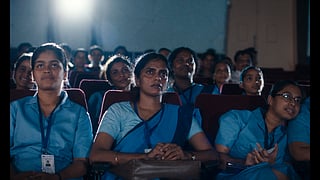- LIFESTYLE
- FASHION
- FOOD
- ENTERTAINMENT
- EVENTS
- CULTURE
- VIDEOS
- WEB STORIES
- GALLERIES
- GADGETS
- CAR & BIKE
- SOCIETY
- TRAVEL
- NORTH EAST
- INDULGE CONNECT

“In the darkness you try to imagine light…but you cannot,” says a character in Payal Kapadia’s debut feature film All We Imagine As Light, and the characters keep trying to find light at the end of the dark tunnel. This year, Kapadia became the first Indian to win the prestigious Grand Prix award at the Cannes Film Festival for her film. The trio of women in the film, nurses Prabha, Anu and the hospital cook Parvaty, played by Kani Kusruti, Divya Prabha and Chhaya Kadam respectively, form the three pillars of the film. As the film hits the theatres today, we breakdown the film into five reasons sharing what makes this film a must watch!
While most films put up Mumbai as the city of dreams, this film rather sees a city through a different light, as the city of illusions. Three women, belonging to three different age groups, try to cope up in the city. As we see the nurses struggle travelling long distances, to and back from their workplaces, braving the whipping lashes of the evening downpours, we also see Parvaty fighting her way to save her roof in the city, which without a legal paper, she fails to do. Prabha and Anu, both from Kerala, and are roommates, share along with the occasional voiceovers by people speaking Bihari and Bengali, how so many people shift to Mumbai to earn their living, yet as Anu says, the earrings are never enough, and they remain living on the fringes of the society.
The companionship between the three women is worth mentioning. While Prabha sometimes doubles up as a motherly figure to Anu, paying her rent, saying harsh words to make her behave well, but going back to say sorry, Anu too showers her gentle affection towards the former. Their minimal yet heart-to-heart conversations speak a thousand words. How Prabha stands with Parvaty helping her get back her house, and travelling with her and Anu to Parvaty’s village to help her settle was worth noticing. The film ends with a scene when Anu brings her boyfriend Shiaz (Hridhu Haroon) at the shack to introduce him with Parvaty and Prabha. They welcome him with open arms (not showing it quite literally) and they end up sitting there together, gazing at the sea while the camera pans out.
Subtlety takes a centrestage in this film, and is a character in itself. Be it the way Prabha cares for Anu, Parvaty or even the man she saved at the beach. She is reserved, yet significantly stands by the people she knows, and at one time, even for the unknown middle-aged man. Be it the political innuendos of not having a ‘kaagaz’ or an interfaith relationship of Anu and Shiaz, Payal deals with sensitive topics like these with much care and subtlety. Even the duo’s meeting at the caves and later the love making at the open jungle could have been extremely intense, but was rather soft and sensual, and one could almost feel the mellow touches as they embraced each other. In the scene, when Prabha clenched the ‘made in Germany’ red rice cooker between her thighs felt like a warm yet gloomy hug, symbolising how much she craved for her husband, with whom she spoke more than a year ago. Even the scene, when the trainee nurses couldn’t stand the stench of a placenta, and Prabha asking to be strong since they are nurses, was that a reminder to herself as well, to be strong or a symbol of a missing motherhood?
They say, opposites attract each other. While Anu was a carefree, talkative young lady who almost never let religion come in between their relationship, or laughed about a nurse shrieking and running away when a male patient got an erection when he was given a sponge bath, Prabha knows her limits. She speaks only when it is absolutely necessary, respectfully walks away when a doctor proposes to her, and even gets visibly embarrassed when trainee nurses wish her good evening while she was speaking with the doctor standing on an overbridge. Her face was like a canvas of her character. Without even putting words, her expressions speak a thousand words. Parvaty too has been quite vocal of what she wants. She tried her luck in helding back her house in Mumbai, and when she couldn’t, she went back to her village Ratnagiri, but she never chose to stay with her son or with Prabha, because as she rightly said, none could drive her away from her “home”. The scene where Parvaty, the eldest of the lot, indulges in an old found bottle of alcohol, makes Prabha and Anu drink to “relax” and dance later on a popular track, felt so liberating. While this was a symbol of liberation, Prabha urinating in the jungle, Anu making love to her boyfriend or kissing at public places, and even changing clothes in front of Prabha felt unshackled.
The camera work needs a special mention indeed. What started to look as a documentary as it started, melted into a feature film before you could relate. The humdrums of the city, the local trains, the street food joints or the clouds and rains are seen commonly in real life, making the film relatable in such a way, which will make you feel differently. The gloomy colour palette too highlights the inner struggles of these three women and even Shiaz for that matter and how each has their own battles to fight, just like us. And at some points, it felt as if it was not a film rather things or occasions we are seeing with our own eyes.